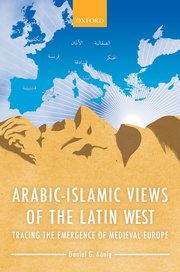Arafat Razzaque reviews Daniel König’s Arabic-Islamic Views of the Latin West: Tracing the Emergence of Medieval Europe.
In 1961, nearly two decades before the stir of Edward Said’s Orientalism, the renowned Oxford medievalist Sir Richard W. Southern was invited by the Harvard history department to deliver a series of three lectures published subsequently as Western Views of Islam in the Middle Ages. Attention to Islam was perhaps an outgrowth of Southern’s lifelong fascination with what he called “scholastic humanism,” the intellectual tide in twelfth-century Europe that partly flowed out of Arabic science and philosophy. But more profoundly, this interest in Islam had to do with the very making of the West, a historical question to which Southern was keenly attuned. His lectures presented a schematic account of what had once been the singular embodiment of Europe’s identity crisis, and memorably declared: “The existence of Islam was the most far-reaching problem in medieval Christendom.” But by the sixteenth century, he argued, “the Islamic question” had become largely passé, not so much because it was resolved, but rather that with a wider view of the world beyond, Islam no longer seemed like the challenge it had before. And so from Edward Gibbon’s armchair in the eighteenth century, the menace of “Arabs or Saracens” was just a distant memory, its morale mainly a cautionary tale for a now self-assured Europe; the Qur’an being taught from the pulpits of Oxford was a hypothetical that Gibbon could indulge with wry amusement. We have no way of knowing how this vision of modern history might have changed had Southern lived just another decade into the twenty-first century. He died in 2001, leaving his mark as one of the most accomplished British historians of his generation.
Publication Type
- Article



